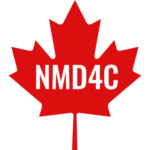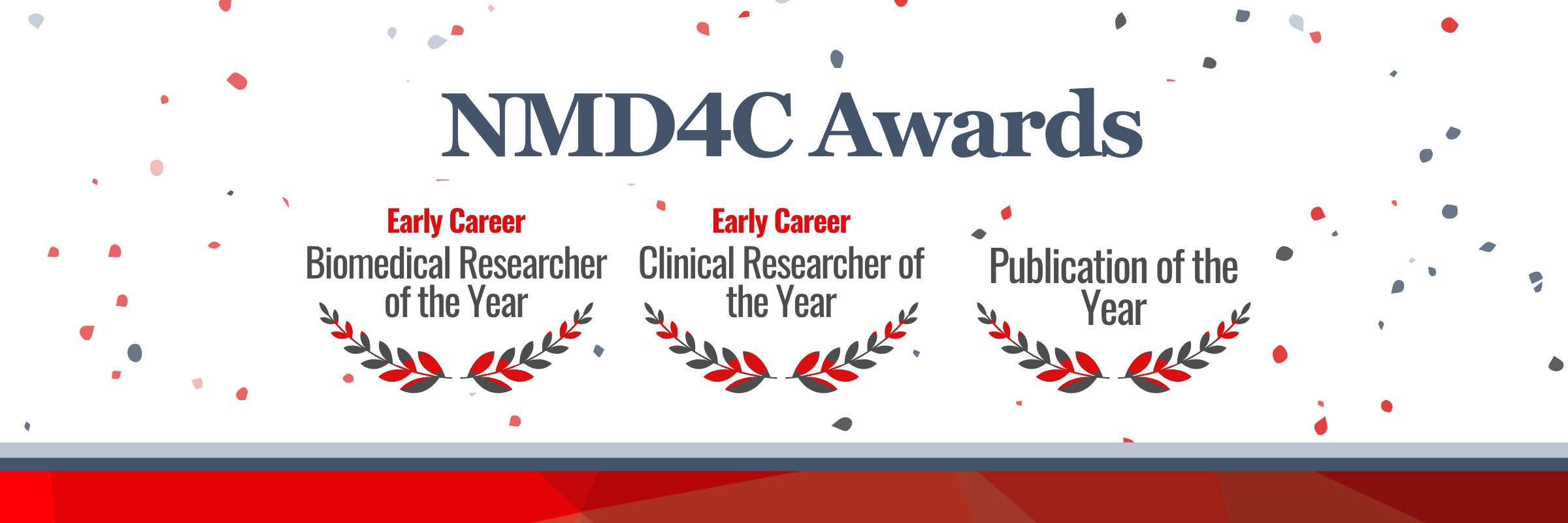
2025 Award Recipients
Early Career Biomedical Researcher of the Year

Dr Kiran Polavarapu
Postdoctoral Researcher, Children's Hospital of Eastern Ontario
Dr Kiran Polavarapu completed his PhD in 2019 at the National Institute of Mental Health and Neurosciences (NIMHANS) in India. He is an M.B.B.S (Bachelor of Medicine and Bachelor of Surgery) graduate who shifted his focus to research in neuromuscular disorders and neurogenetics. His PhD work involved developing next generation sequencing (NGS)-based tests for detection of both copy number variations and point mutations in Duchenne Muscular Dystrophy.
Major Achievements
Through exceptional research abilities and a desire to work on novel analysis methods in rare disease genomics, Dr Polavarapu pushes analytic and scientific boundaries to make a difference to patients who remain without a diagnosis after standard diagnostic workup. His medical background and seven years of clinical experience in a neuromuscular clinic mean that he has a clinical understanding of neuromuscular phenotypes and presentations that are rare to find in a dry lab researcher. He combines this with a depth of expertise in medical genomics in his work with Dr Hanns Lochmüller’s team, solving many undiagnosed cases from this neuromuscular cohort.
Dr Polavarapu published three notable papers in the past year, including a joint first authorship in Nature Medicine, adding to his career total of over 100 publications.
Dr Polavarapu is first author of the publication in BRAIN, identifying the genetic cause of Congenital Myasthenic Syndromes (CMS) through exome sequencing in more than 100 families from India, one of the largest studies in CMS to date. This study identified numerous new genes, mutations and phenotypes, benefiting patients and their families by defining a molecular diagnosis allowing for effective treatment.
Kiran is a co-author on a publication in SCIENCE led by a team in Germany that elucidated the role of a group of chaperonin genes (TRiC) in patients with variable brain malformation and neurodevelopmental phenotypes through analysis of genome data in a large database (RD-Connect GPAP).
Kiran is the co-first author of the publication in NATURE MEDICINE solving 500 undiagnosed cases through programmatic exome reanalysis in a large cohort within the SOLVE-RD project in a collaborative effort led by teams in Spain and The Netherlands.
Dr Polavarapu’s work has also had a global impact, particularly for patients in India and Turkey, which are both regions underrepresented in genomic research and diagnostics, ensuring that the data from the patients analysed for his research is all accessible via the RD-Connect Genome-Phenome Analysis Platform (GPAP) to the clinicians and researchers in these regions who submitted the patients for analysis, contributing to upskilling of researchers in these regions and ensuring that the patient data is not used for Western research without remaining accessible in its country of origin.
Early Career Publication of the Year
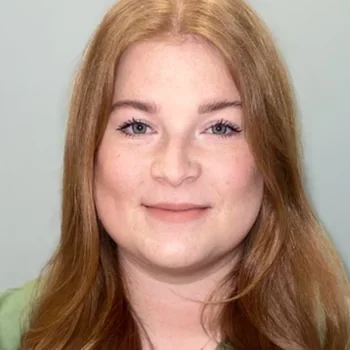
Dr Emma Sutton
Postdoctoral Researcher, The Ottawa Hospital Research Institute
Liver SMN restoration rescues the Smn2B/- mouse model of spinal muscular atrophy
Published in the journal eBIOMedicine.
Publication Highlights
Dr Sutton is the first author on a paper published at eBioMedicine entitled "Liver SMN restoration rescues the Smn2B/- mouse model of spinal muscular atrophy". Through this research, Dr Sutton shows that liver pathology in Spinal muscular atrophy (SMA) is a direct impact of liver intrinsic survival motor neuron (SMN) depletion, and demonstrates that the liver contributes to whole-body pathologies in SMA. This is significant because the importance of peripheral liver SMN is not yet known and could help further elucidate therapeutic targets for SMA.
About Dr Emma Sutton
Dr Emma Sutton completed her bachelor’s degree in Neuroscience where she then went on to obtain her PhD from the Faculty of Medicine at Keele University, England. During her PhD, Emma was chosen as the postgraduate representative for the Faculty of Medicine and actively participated in various committee panels, including two ethics boards and a diversity and inclusion committee. Emma moved to Ottawa, Canada, to pursue a post-doctoral fellowship in Dr Rashmi Kothary’s laboratory at the OHRI, leading innovative research on SMA. In a short time, Emma has made significant contributions to three papers that have been published from the lab in 2024 in the journals Nature Biomedical Engineering, Journal of Neuromuscular Disorders, and eLife. Emma is a 2025 NMD4C and Muscular Dystrophy Canada (MDC) postdoctoral research fellowship awardee, a MDC Co-PI translation grant awardee, and a University of Ottawa Dr Eric Poulin Centre for Neuromuscular Disease post-doctoral outstanding research awardee.
Most recently Emma has been selected as co-chair for the new, NMDC, basic science trainee committee (BSTC) and continues to involve herself in the wider aspects of research, networking with the Canadian neuromuscular field and plans to continue high end research with her recent grants and publish in top quality journals.
Early Career Clinical Researcher of the Year
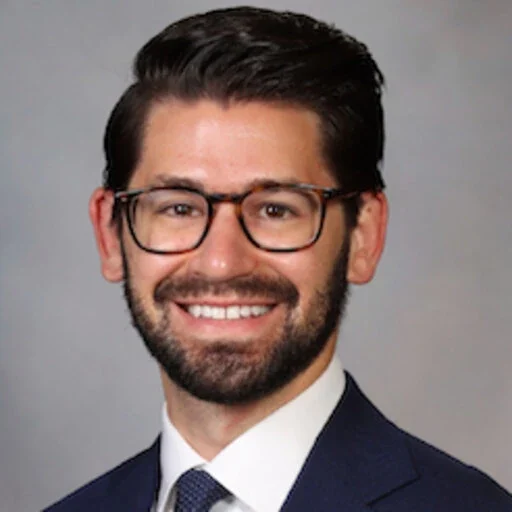
Dr Grayson Beecher
Assistant Professor, Division of Neurology, Department of Medicine, University of Alberta
Dr Grayson Beecher is an Assistant Professor in the Division of Neurology at the University of Alberta and the Medical Director of the Kaye Edmonton Clinic EMG Laboratory. He completed residency in Adult Neurology in 2020, at the University of Alberta, following which he completed a two-year fellowship in Neuromuscular Medicine at the Mayo Clinic (Rochester, MN) and subsequently returned to faculty at the University of Alberta in July 2022. Dr Beecher holds certification in electromyography from both the Canadian Society of Clinical Neurophysiologists (CSCN) and the American Board of Electrodiagnostic Medicine (ABEM). He has research interests in autoimmune neuromuscular disorders and neuromuscular ultrasound. Dr Beecher is a clinician-researcher, mentor, educator, and leader in neuromuscular ultrasound (NMUS) clinical research and integration in clinical practice and education. Since 2017, Dr Beecher has published 34 journal articles and a book chapter and his research has spanned diagnostic, therapeutic, and educational innovations.
Major Achievements
Dr Beecher has made significant contributions to the clinical neuromuscular research through his consistent and diverse research initiatives, notably publishing an original research article “Paradoxical thinning of the diaphragm on ultrasound is a risk factor for requiring non-invasive ventilation in patients with neuromuscular diaphragmatic dysfunction” in Muscle & Nerve in 2024. This study found that paradoxical thinning is an independent risk factor for non-invasive ventilation requirement, with the high impact on clinical practice demonstrated by an invitation for Dr Beecher to present the findings during the diaphragm ultrasound lecture series at the 2024 AANEM Annual Meeting.
Dr Beecher continues to be a leader in Canadian NMUS, and as Medical Director of the University of Alberta’s EMG Laboratory has overseen the successful integration of high-frequency ultrasound systems and obtained two competitive grants to support NMUS infrastructure and research in his first two years as faculty. Dr Beecher has also advocated for clinical NMUS training and education and conducted research on the value and feasibility of clinical education of NMUS, serving as corresponding author on “Feasibility, Reliability, and Educational Value of Neuromuscular Ultrasound Training in a Canadian Neurology Residency Program: A Pilot Study” in 2024. This research addresses the gap in NMUS training in Canada, demonstrating both feasibility and high educational value with residents across levels of training, underscoring the need for sustained efforts to integrate NMUS into Canadian neurology training programs.
Beyond research, Dr Beecher is a mentor for neurology residents, with many achieving co-authorship on publications and career development opportunities, including receiving 2025 NMD4C/MDC fellowship funding under Dr Beecher’s mentorship. Dr Beecher has been recognized with teaching awards including the Division of Neurology’s Teacher of the Year (2022), Physical Exam Preceptor of the Year award for undergraduate medical education Class of 2025 (2023) and the AAN’s A.B. Baker Teacher Recognition Award (2024).
Early Career Clinical Researcher of the Year
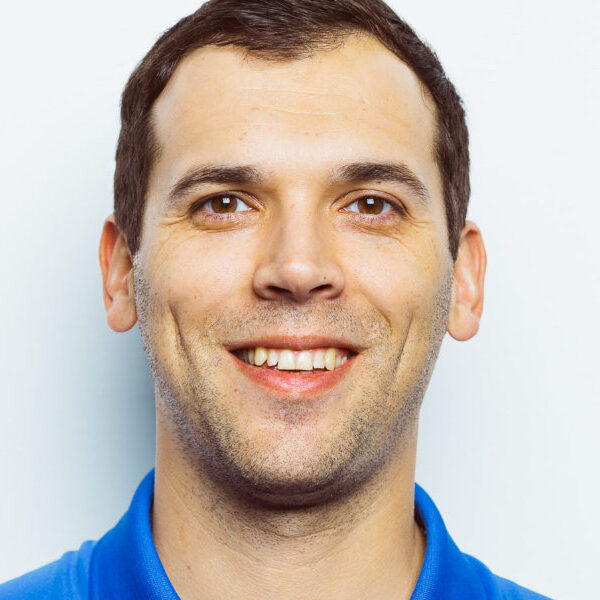
Dr Xavier Rodrigue
Associate Clinical Professor, Rehabilitation, Université Laval, Chief Physiatrist, Centre intégré universitaire de santé et de services sociaux de la Capitale-Nationale
Dr Xavier Rodrigue is an Associate Clinical Professor of Rehabilitation at Université Laval, and Chief Physiatrist at CIUSSSCN. He specializes in the rehabilitation of children and adults with neuromuscular diseases, patients that have undergone amputation, gait defects, orthotics-prostheses, and neuropathic and phantom pain.
Major Achievements
Dr Xavier Rodrigue has made exceptional contributions to the field of spinal muscular atrophy (SMA) care and research. In 2022, he co-founded the Quebec spinal muscular atrophy network (RQAS), uniting over 130 rehabilitation clinicians, researchers, and patient partners across the province to standardize evaluations and update outcome measures. His leadership in this area extends nationally as in 2021 he helped initiate a project with Dr Colleen O'Connell to develop a national consensus for a Canadian SMA measurement toolkit, and was among the group of Canadian experts that helped update these recommendations in 2023.
In 2024, Dr Rodrigue led the organization of a professional development opportunity for French-speaking physiotherapists and occupational therapists on assessment measures and practices for SMA, allowing Quebec-based clinicians to work through current problems and challenges to improve how these measures that are often tied to drug reimbursement are conducted.
His dedication to clinical SMA research is exemplified in his 2024 study A Real-World Study of Nusinersen Effects in Adults with Spinal Muscular Atrophy Type 2 and 3. The first Canadian publication on adult SMA patients, the study showed positive effects of nusinersen in adults with SMA through improvement in motor function and subjective gains, helping provide the evidence needed to advocate for equitable access to care for Canadians affected by SMA.
Beyond his work in SMA, Dr Rodrigue participates in numerous research initiatives with GRIMN and DMSCOPE, contributing to data registries and physical activity protocols for patients with Oculopharyngeal muscular dystrophy, Myotonic dystrophy, and ARSACS.
2024 Award Recipients
Early Career Biomedical Researcher of the Year
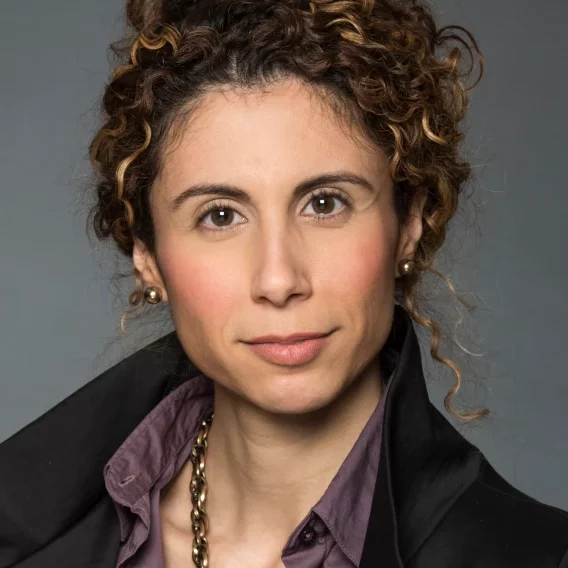
Dr. Mireille Khacho
Assistant Professor, Department of Biochemistry, Microbiology & Immunology, Faculty of Medicine, University of Ottawa
Dr. Mireille Khacho is an Assistant Professor in the Department of Biochemistry, Microbiology and Immunology at the University of Ottawa, whose research focuses on the role of mitochondrial function and dynamics in key cellular processes that regulate stem cell function in tissue homeostasis, elucidate the fundamental behavior of mitochondria in muscle stem cells, and the underlying role of mitochondrial dysfunction in degenerative disorders.
As an Early Career Researcher, Dr. Khacho has established herself as an emerging international leader in neuromuscular research while holding a Tier 2 Canada Research Chair in Mitochondrial Dynamics and Regenerative Medicine. Her excellence and impact have been recognized through attracting over $2.7 million in peer-reviewed funding, publishing as lead or corresponding author in prestigious journals such as Cell Stem Cell, and obtaining significant recognitions including the J.P. Bickell Award and the Stem Cell Network Young Investigator Award.
Since 2018, Dr. Khacho has published 13 articles and invited reviews in peer-reviewed journals, and her outreach and knowledge mobilization efforts are evidenced by having presented at 38 international and national conferences. She is a dedicated mentor and champion for the next generation of researchers, having mentored a total of 37 trainees who have been highly successful in securing numerous scholarships, fellowships, and recognition with numerous abstract and presentation awards.
Major Achievements
Dr. Khacho uncovered that mitochondrial dynamics play an instructive role in the regulation of adult muscle stem cell quiescence and their ability to activate, upon muscle injury or damage, to commence the process of muscle regeneration. Her work showed that dysregulation of mitochondrial dynamics causes severe defects in adult muscle stem cells and completely impairs muscle regeneration. The importance of this work is underscored by the fact that it was featured on the cover of Cell Stem Cell and highlighted in a Preview in Cell Stem Cell.
Dr. Khacho uncovered a novel and fundamental role for mitochondrial dynamics in the regulation of stem cell metabolism, self-renewal capacity and fate decisions. This Cell Stem Cell publication was the first to reveal that mitochondria in stem cells can communicate with the nucleus to control gene expression, thereby regulating the expression of key genes that modulate cell fate decisions. This research also demonstrated that dysregulated mitochondrial dynamics and function has a profound impact on stem cells and the differentiation process during development and in adult tissue regeneration. This work has important implications for aging and regenerative medicine and was recommended by Faculty of 1000 as being of special significance in its field
Dr. Khacho demonstrated that dysregulated mitochondrial function and dynamics has a profound impact on stem cells during development and in adult tissue regulation. She showed for the first time that loss of proper mitochondrial function in neural stem cells, either during development or in an adult context, is an etiological factor leading to neurodevelopmental defects and cognitive dysfunction. Within the context of neural stem cells, her work uncovered that cognitive decline during aging or in neurodegenerative disease may be due to dysfunctional mitochondria in the neural stem cell pool. These findings have major implications in understanding not only aging and degenerative diseases but also the basic mechanisms of adult stem cell maintenance.
Early Career Publication of the Year
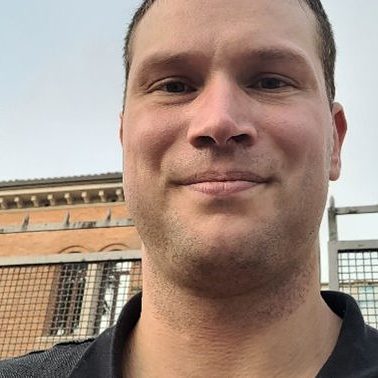
Dr. Jean-Philippe Leduc Gaudet
Assistant Professor in the Medical Biology Department at Université du Québec à Trois-Rivières (UQTR), Université du Québec à Trois-Rivières
MYTHO is a novel regulator of skeletal muscle autophagy and integrity, published in the journal Nature Communications.
Dr. Jean-Philippe Leduc Gaudet is an Assistant Professor in the Medical Biology Department at Université du Québec à Trois-Rivières (UQTR), establishing his new laboratory there since June 2023. Dr. Leduc Gaudet completed his BSc and MSc in Kinesiology at the Université du Québec à Montréal (UQAM) before going on to complete PhD studies in Experimental Medicine at McGill University, and a postdoctoral fellowship at the Veneto Institute of Molecular Medicine and at the RI-MUHC. Dr. Leduc Gaudet’s research is focused on the various signaling pathways that control protein breakdown and protein synthesis, with a particular emphasis on the discovery and characterization of novel genes that are involved in muscular diseases. Dr. Leduc Gaudet’s publication was featured on the Nature Communications Editors’ Highlights webpage, and he was recently invited to publish a highlight of this work in the prestigious journal Autophagy.
Paper Highlights
The results of the publication “MYTHO is a novel regulator of skeletal muscle autophagy and integrity” suggests that dysregulation of Mytho expression may contribute to human muscular diseases, opening new paths to understanding the fundamental importance of proteolytic signaling in regulating skeletal muscle health.
Autophagy is a multistep process responsible for the removal and recycling of superfluous or dysfunctional cell components, and it is essential for regulating skeletal muscle health. Emerging evidence shows that when autophagy is not functioning properly due to physiopathological conditions, such as neuromuscular diseases, skeletal muscle will develop weakness, atrophy, degeneration, and fibrosis. Despite the significant progress made by scientists in quantifying the functional importance of autophagy in the regulation of skeletal muscle mass and function, important gaps remain in understanding the molecular machinery that regulates autophagy in skeletal muscles.
This paper identifies a novel FoxO-dependent Riken gene, d230025d16Rik, named Macroautophagy and YouTH Optimizer (MYTHO). The authors demonstrate that Mytho is a critical regulator of autophagy and skeletal muscle integrity in vivo, and that its knockdown protects against muscle atrophy in a wide range of acute catabolic conditions. Prolonged silencing, however, causes severe myopathy. In other experiments, the paper highlights that muscle biopsy samples of human patients diagnosed with myotonic dystrophy type 1 (DM1) display reduced Mytho expression, activation of the mTORC1 signaling pathway and impaired autophagy.
2023
Early Career Biomedical Researcher of the Year
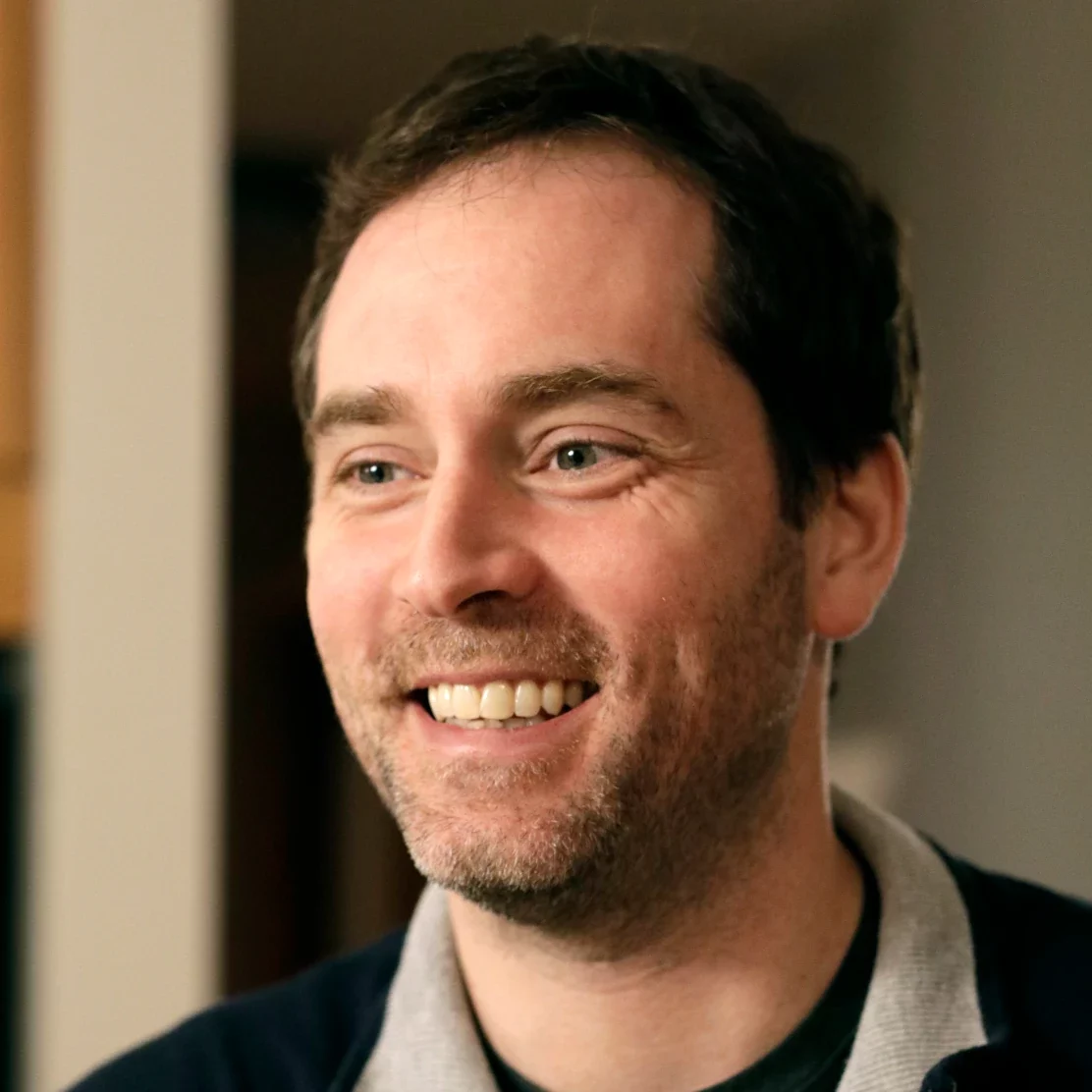
Dr. Nicolas Dumont
Associate professor, Rehabilitation department, University of Montreal
Principal Investigator, Musculoskeletal health research axis, Sainte-Justine Hospital research center
Dr. Nicolas Dumont obtained his PhD at the Université Laval where he studied the regulatory network between inflammatory cells and skeletal muscles. He did his post-doctoral training at the Ottawa Hospital Research Institute in Dr. Michael Rudnicki’s lab, where he studied muscle stem cell defects in Duchenne Muscular Dystrophy. Dr. Dumont became an assistant professor at the Université de Montréal in 2016, and he established his lab at the Sainte-Justine hospital research center. His research program is divided in 3 axes: 1) characterizing the intrinsic mechanisms regulating muscle stem cell fate decision during myogenesis, 2) characterizing the impact of rare genetic variants on muscle stem cell function, and 3) investigating novel therapeutic avenues targeting defective muscle stem cells to mitigate muscular dystrophies. Dr. Dumont holds a FRQS Junior-2 award, and his lab is funded by grants from the CIHR, NSERC, ThéCell network, Stem Cell Network, Orphan disease center, AFM-Telethon, and Muscular Dystrophy Canada.
Major Achievements
Dr. Nicolas Dumont has developed an innovative research program that is focused on the comprehension of muscle stem cell defects in different muscular diseases, based on his paradigm-shifting discovery showing that dystrophin-deficient muscle stem cells are intrinsically defective in Duchenne Muscular Dystrophy (DMD).
He recently showed that these defective cells can be targeted with therapeutic compounds (Resolvins) to restore their regenerative potential, identifying a novel therapeutic approach for DMD that is more potent than the current standard-of-care treatment as a corresponding author of “Resolvin-D2 targets myogenic cells and improves muscle regeneration in Duchenne Muscular Dystrophy” in Nature Communications.
Dr. Dumont has expanded his expertise to neuromuscular diseases beyond DMD; in collaboration with an international team of experts, he identified a new human myopathy (named MYOSCO) that affects muscle stem cells, identifying a new class of human myopathies specifically affecting muscle stem cells as corresponding author of “Biallelic variants in the transcription factor PAX7 are a new genetic cause of Myopathy” in Genetics in Medicine.
Moreover, in collaboration with Dr Elise Duchesne, he also identified that muscle stem cells become prematurely senescent in myotonic dystrophy type 1, and that these defective cells can be eliminated by specific drugs to restore muscle regeneration as a corresponding author of " Clearance of defective muscle stem cells by senolytics reduces the expression of senescence-associated secretory phenotype and restores myogenesis in myotonic dystrophy type 1” in BiorXiv.
Early Career Clinical Researcher of the Year
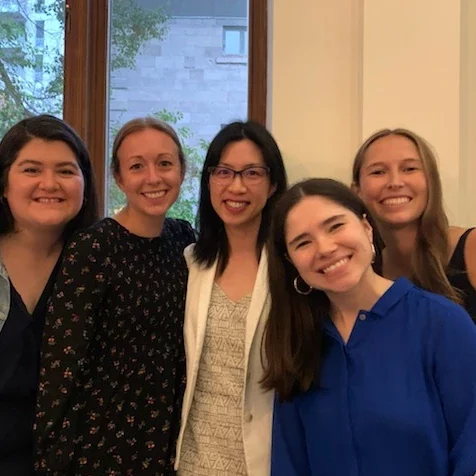
Dr. Cam-Tu Émilie Nguyen
Neurologist, Assistant Professor, CHU Sainte-Justine, Université de Montréal
Dr. Cam-Tu Émilie Nguyen is a pediatric neurologist specialized in neuromuscular disorders at CHU Sainte-Justine in Montreal. Dr. Nguyen is the medical director of the Neuromuscular clinic at Marie Enfant Rehabilitation Centre of CHU Sainte-Justine. Dr. Nguyen completed a fellowship in EMG and neuromuscular disorders at McGill University, the London Health Sciences Centre under Dr. Craig Campbell’s supervision, and The Hospital for Sick Children (SickKids). She received an EMG Diploma from the Canadian Society of Clinical Neurophysiologists (CSCN) and was the recipient of the CSCN Fellowship in Neuromuscular Medicine & Electromyography in 2015.
Major Achievements
As the Medical Director of the Neuromuscular clinic at Centre de réadaptation Marie Enfant of CHU Sainte-Justine, Dr. Nguyen holds a prominent leadership role in implementing genetic therapies for children, and played a pivotal role in the construction of the nusinersen and the onasemnogene abeparvovec administration programs for spinal muscular atrophy patients.
Dr. Nguyen’s contribution to the neuromuscular field also include clinical characterization and new treatment approach of rare neuromuscular disorders, for which she was awarded best Poster at ICNMD2018 and a WMS membership award at WMS 2019.
Dr. Nguyen’s outstanding teaching and media communication skills saw her present in over 10 television, newspaper and radio interviews and receive a teaching award in 2022 as residents from the Université de Montréal Pediatric Neurology program unanimously voted her the Best Professor of the program!
Early Career Publication of the Year
Babaeijandaghi F, Cheng R, Kajabadi N, Soliman H, Chang CK, Smandych J, Tung LW, Long R, Ghassemi A, Rossi FMV. Metabolic reprogramming of skeletal muscle by resident macrophages points to CSF1R inhibitors as muscular dystrophy therapeutics. Sci Transl Med. 2022 Jun 29;14(651). doi: 10.1126
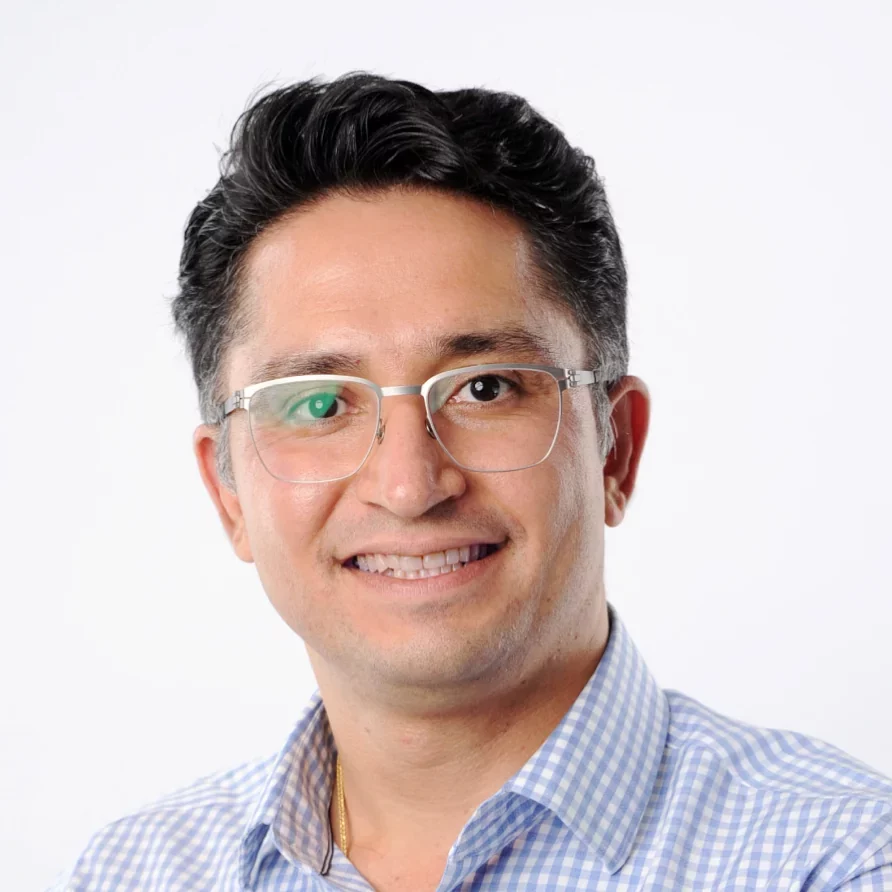
Dr. Babaeijandaghi received his MD from Tehran University of Medical Sciences before achieving his PhD in Experimental Medicine from the University of British Columbia. During his PhD, he worked under supervision of Dr. Fabio Rossi to study the role of stromal cells including resident macrophages and fibro-adipogenic progenitors in muscle regeneration and fibrosis. Currently, he is a scientist at Altos Labs in San Diego, California focusing on muscle aging and rejuvenation.
“Metabolic reprogramming of skeletal muscle by resident macrophages points to CSF1R inhibitors as muscular dystrophy therapeutics” is published in Science Translational Medicine. Dr. Babaeijandaghi's work characterizes resident macrophages in skeletal muscle and identifies their role in acute and chronic damage, ultimately identifying a novel therapeutic strategy for DMD. His discovery that a drug interfering with muscle-resident macrophages also leads to reprogramming of myofibres to a damage-resistant phenotype opens a new path to manage the disease.
Honorable Mention
Resolvin-D2 targets myogenic cells and improves muscle regeneration in Duchenne muscular dystrophy
Dort J, Orfi Z, Fabre P, Molina T, Conte TC, Greffard K, Pellerito O, Bilodeau JF, Dumont NA. Resolvin-D2 targets myogenic cells and improves muscle regeneration in Duchenne muscular dystrophy. Nat Commun. 2021 Oct 29;12(1):6264. doi: 10.1038/s41467-021-26516-0.
